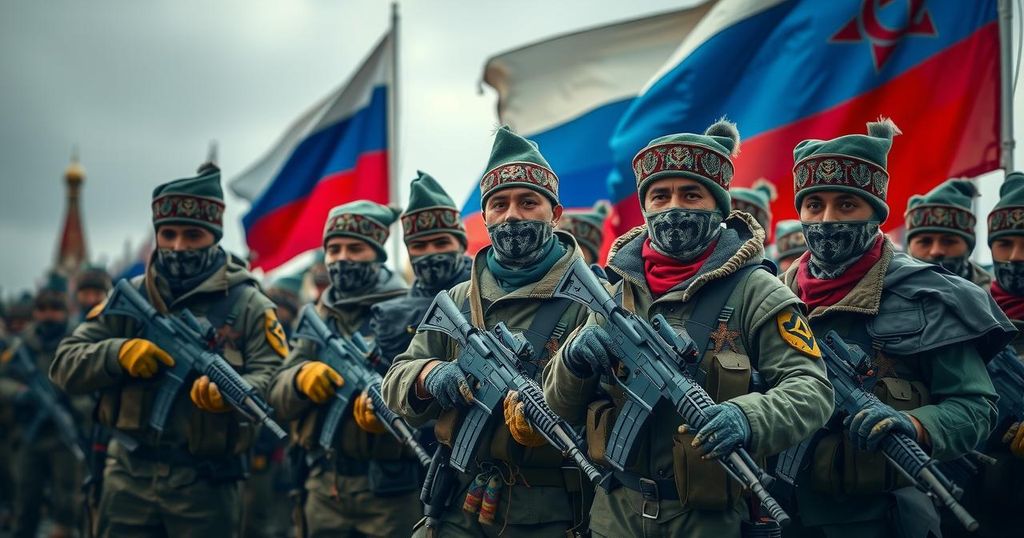Strategic Implications of Russia’s Recruitment of Yemeni Mercenaries Through Houthis
Russia’s recruitment of Yemeni fighters through Houthi connections marks a strategic effort to address its military needs in Ukraine while strengthening ties with Iran and its proxies. This collaboration allows Russia to disrupt maritime security in the Red Sea, impacting regional dynamics and U.S. interests, all while maintaining a pragmatic approach that balances military support with diplomatic engagement with various Yemeni factions.
Recent reports indicate that Russia has successfully recruited hundreds of Yemeni men, facilitated by their relationship with Yemen’s Houthi rebels. These recruits are offered lucrative salaries and potential Russian citizenship for roles in engineering and security, being sent to fight for Russia amidst the ongoing conflict. This recruitment not only provides financial benefits to the Houthis but also offers military training to Yemeni men in their controlled territories. Moreover, the recruitment seeks to counteract heavy losses faced by Russian forces in Ukraine by utilizing migrant recruits from various nations, including Yemen, Nepal, India, and North Korea.
The escalating ties between Russia and the Houthis have gained importance particularly in the context of the recent Hamas-led attack on Israel. The Houthis have been increasingly recognized as a significant aspect of Iran’s coalition of allied groups, amplifying their role within Iran’s “Axis of Resistance.” Notably, there have been indications of Iran potentially facilitating an agreement for Russia to supply advanced weaponry to the Houthis, including P-800 Oniks missiles, although such transfers remain unverified. Recent statements from U.S. officials, such as Special Envoy for Yemen Timothy Lenderking, affirm that Russia is pursuing closer connections with the Houthis, and reports suggest that the Kremlin may be providing small arms and intelligence support to strengthen their maritime operations.
For Russia, strengthening relations with the Houthis has multiple advantages beyond military recruitment. By arming the Houthis, Russia hopes to destabilize maritime routes in the Red Sea, posing challenges to Western shipping interests and redirecting attention towards the Middle East. Furthermore, this partnership allows Russia to enhance its political leverage over influential regional players like the United Arab Emirates and Saudi Arabia, which are invested in resolving the Yemen conflict. However, the relationship is characterized more as a practical partnership, reliant on the Houthis maintaining a non-aggressive stance towards Saudi and Emirati interests while serving Russia’s broader strategic objectives against the United States.
The implications of this cooperation are severe, particularly for the U.S. and its allies. The Houthis have already been capable of disrupting maritime trade significantly, and an infusion of advanced Russian weaponry could exacerbate these disruptions. Should Russia chose to enhance the Houthis’ capacities in military manufacturing, their operational independence from Iranian support may increase, enabling them to undertake operations that might not align with Tehran’s interests. This unpredictability poses a serious regional security threat and warrants attention from U.S. actors invested in stabilizing the Middle East.
The article addresses the growing cooperation between Russia, Iran, and the Houthis amid ongoing geopolitical tensions in the Middle East. It examines how Russia has begun recruiting Yemeni fighters through its connections with the Houthis, as a method to replenish its ranks in Ukraine while simultaneously fostering an alliance with a key Iranian proxy. The background of this recruitment ties into broader shifts in regional power dynamics, particularly in the wake of increased adversarial actions against the U.S. and its allies by Iran-backed groups.
In conclusion, Russia’s recruitment of Yemeni mercenaries reflects a complex interplay of military strategy and regional alliances amid shifting geopolitical landscapes. This partnership provides financial and military benefits to the Houthis while allowing Russia to exert pressure on U.S. interests and strengthen its position in the Middle East. However, it remains essential to perceive this cooperation as a tactical collaboration rather than a deeply integrated alliance, with implications that could significantly alter maritime security dynamics in the region.
Original Source: www.atlanticcouncil.org




Post Comment